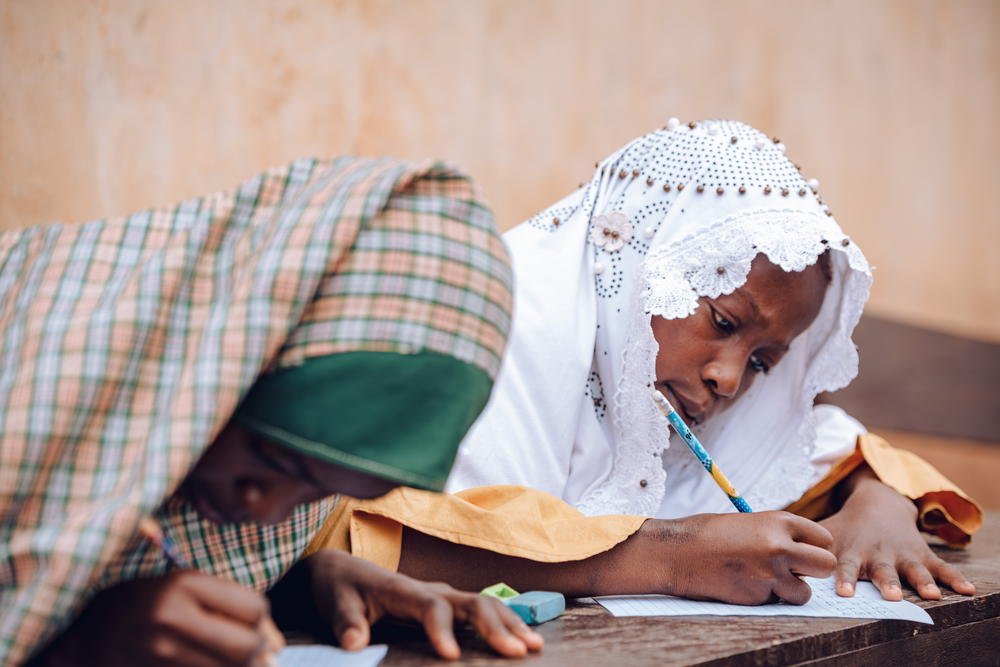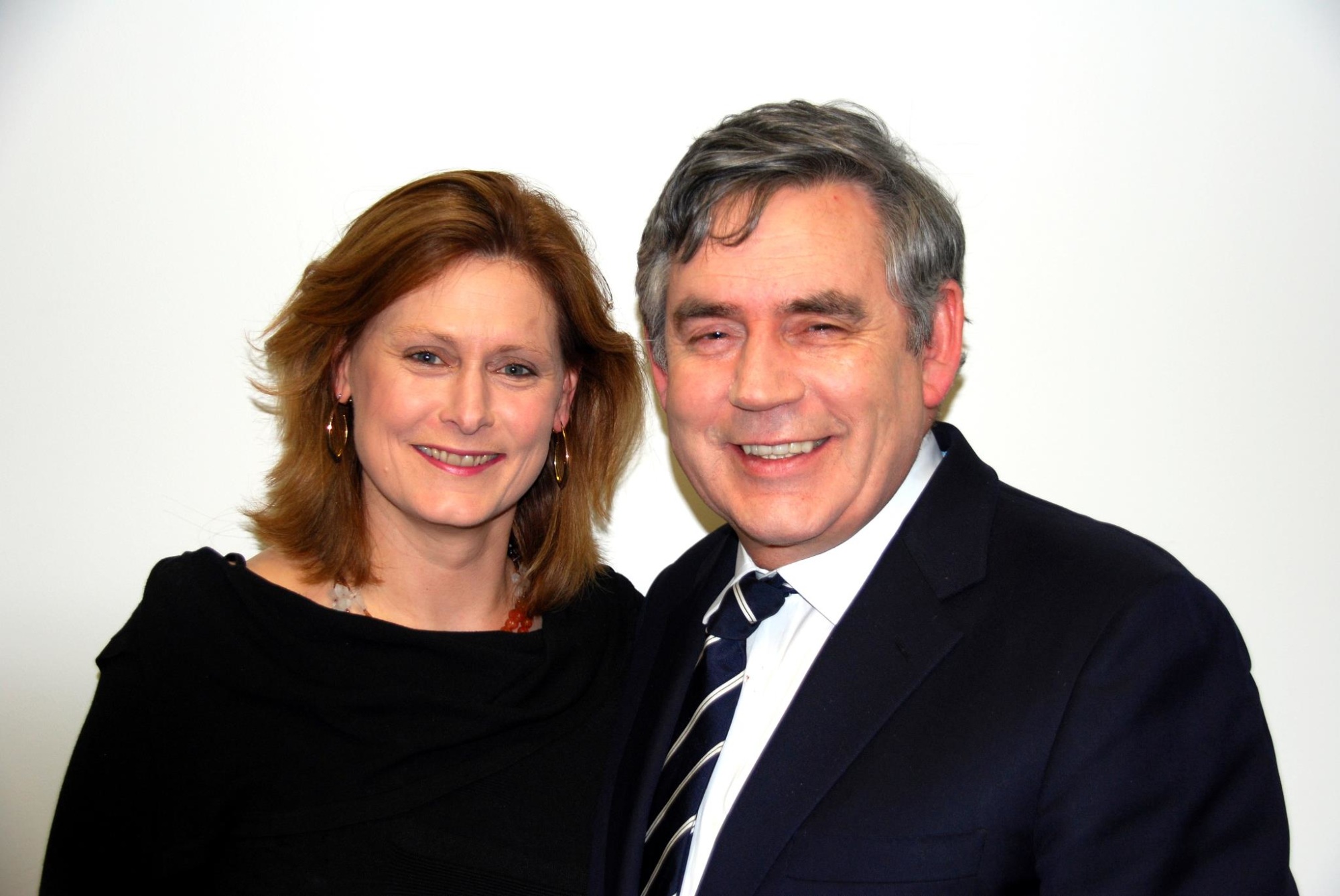
20 years of Theirworld: 20 key moments in our story of unlocking big change for young people
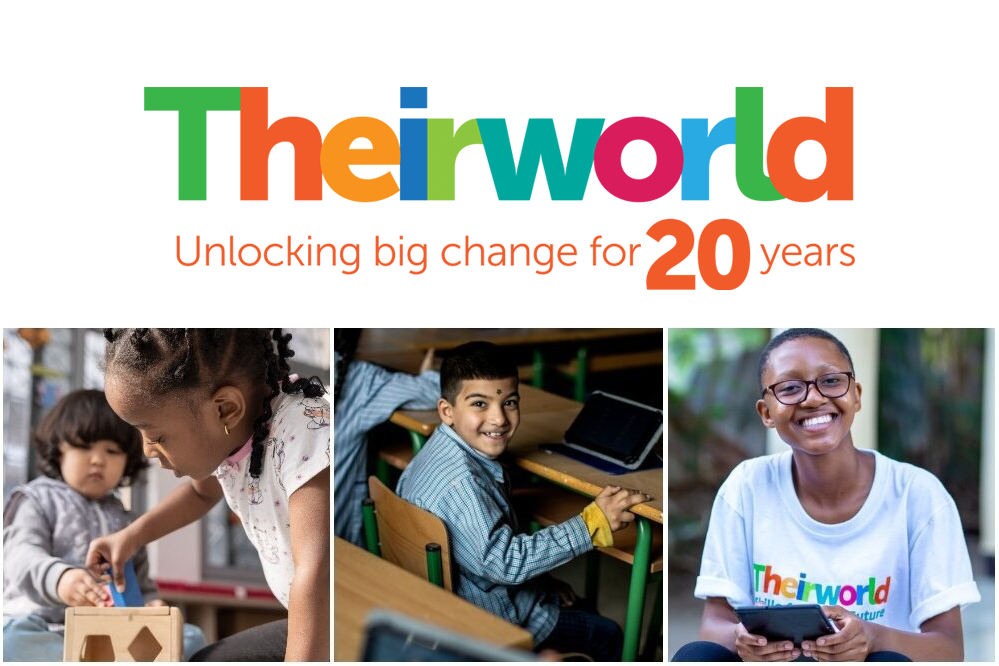
Sarah Brown
We look at two decades of innovation, campaigning and working to give children and young people the best start in life, a safe place to learn and skills for the future.
Jump to
- 1. PiggyBankKids is launched in 2002
- 2. Small Grants programme starts in 2004
- 3. Jennifer Brown Research Laboratory opens in 2004
- 4. Global Business Coalition for Education is launched in 2012
- 5. The Theirworld name is born in 2013
- 6. A World at School begins in 2013
- 7. We drive double-shift schools for Lebanon in 2013
- 8. Nigeria Safe Schools Initiative in 2014
- 9. #UpForSchool petition gets 10m signatures in 2015
- 10. Edinburgh Birth Cohort begins its 25-year journey in 2015
- 11. Intensifying support for Syrian refugees in 2015
- 12. Code Clubs are launched in 2016
- 13. Turkey trauma and language programmes begin in 2016
- 14. Education Cannot Wait gets off the ground in 2016
- 15. We widen our focus on early years in 2016
- 16. Youth campaign leads to a new global fund in 2018
- 17. Our work with Greek islands refugees starts in 2019
- 18. The Key unlocks big change in 2020
- 19. We create the Education Finance Playbook in 2021
- 20. From small beginnings to 1,000 new Global Youth Ambassadors
- And there's much more to come in 2022
1. PiggyBankKids is launched in 2002
Sarah Brown – now Chair of Theirworld – founded PiggyBankKids along with Gil Mcneil CBE and David Boutcher MBE with a simple aim: to support scientific and community research that would help the most vulnerable children have the best start in life.
Alongside it was the Jennifer Brown Research Fund, set up in memory of Sarah and Gordon’s baby daughter to invest in the best medical research for safe pregnancy and premature birth.
It also supported innovative community-based schemes led by nurses and midwives. One beneficiary was Joan Taylor, a midwife from Fife, Scotland, who set up a specialist reflex therapy service that relieved morning sickness, breast-feeding problems and stress. When she retired in 2017 with an MBE award, Joan said: “Sarah gave me an amazing start and I couldn’t have done this without her help.”
2. Small Grants programme starts in 2004
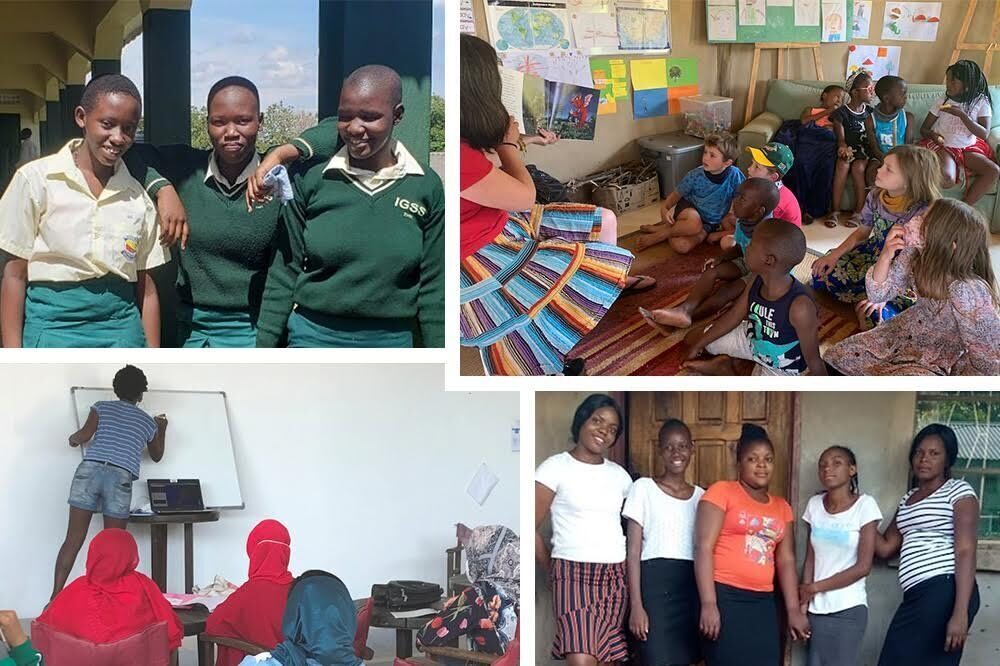
Some of the beneficiaries of the Small Grants programme in 2021
The early PiggyBankKids projects were forerunners of the Small Grants programme, which was set up to help unlock community action projects. They ranged from Granny School (a refresher course for first-time grandparents) to Learning Care Pathways for Disabled and Vulnerable Mums.
In the 18 years since, Theirworld has made awards totalling more than £500,000. Grants of between £1,000 and £15,000 are made to charities or non-profits at the discretion of our trustees.
Last year they helped a variety of projects in the UK and beyond – from the construction of a house for village school teachers in Ghana to a UK charity that helps children who have lost a sister or brother. Sibling Support said: “Thanks to Theirworld’s funding, we’ve created and distributed thousands of sibling-specific booklets across the UK – from hospices to schools – that help young people with their grief.”
3. Jennifer Brown Research Laboratory opens in 2004
Established at the University of Edinburgh with a small team of brilliant young scientists – all women – the laboratory was overseen by dedicated clinical experts from the New Royal Infirmary Edinburgh. Its aim was to explore what happens when children are born prematurely.
The team’s pioneering research found early success with academic publications and awards. The knowledge gained was transferred to clinical work – allowing doctors, midwives and nurses to better care for the most vulnerable premature babies.
The Jennifer Brown Research Laboratory has gone on to become a ground-breaking, world-class centre. It also led to the creation of The Theirworld Edinburgh Birth Cohort (more on this later), as well as Theirworld’s focus on early childhood education.
At an event to mark 15 years of the laboratory in 2017, Catherine Smith praised the team’s research for saving her daughter Ella’s life. She said: “I count myself very lucky that we got our baby home and I will be forever grateful.”
4. Global Business Coalition for Education is launched in 2012
- Watch our video about the Big Ideas, Bright Cities challenge launched by the Global Business Coalition for Education in 2021
Founded by the charity as a separate initiative to bring together the expertise and resource of the business community with campaigning on global education. At a Global Business Coalition for Education (GBC-Education) event that year, United Nations Secretary-General Ban Ki-moon told company leaders: “You understand investment. You focus on the bottom line. You know the dividends of education for all society.”
In 2016, the coalition committed to mobilise $100 million in financial and in-kind resources for a new fund for education in emergencies. The next year it launched the Youth Skills and Innovation Commission, followed by the innovative REACT initiative to help the private sector contribute to education in emergencies.
In 2020, a partnership was launched with the BHP Foundation to improve the tools and resources available to the business community to make strategic investments in education.
After early childhood development and disabilities projects, GBC- Education recently announced its latest venture – the Big Ideas, Bright Cities challenge to drive innovation and creativity in building skills for young people.
5. The Theirworld name is born in 2013
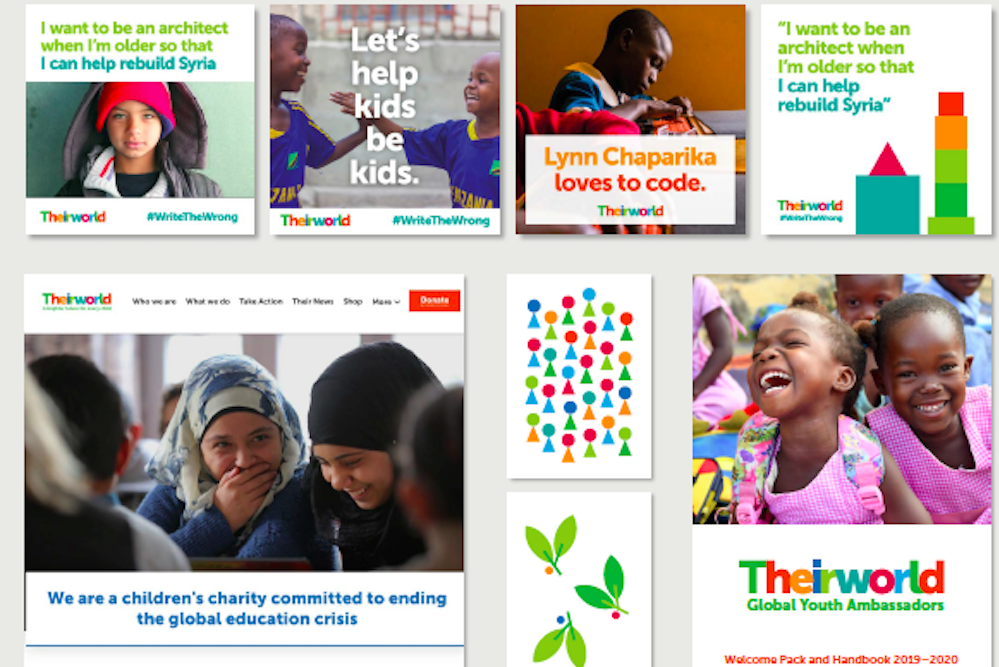
Theirworld’s branding is bold, clear and optimistic to reflect our values and outlook
It was becoming clear that education was the key to solving many of the world’s major problems. But it was consistently under-prioritised and underfunded.
Sarah Brown said: “We recognised that if we did not address the global education crisis, then we could never make progress for health and wellbeing, nutrition, gender equality, climate change or anything else. All the UN Sustainable Development Goals were out of reach without finding a way to fund and improve education for every child. It was time to launch Theirworld and put the focus on education.”
Branding and design experts were brought in and a new name, look and purpose took shape. Theirworld was born – ready for the challenge of growing the reputation and profile of the organisation.
6. A World at School begins in 2013
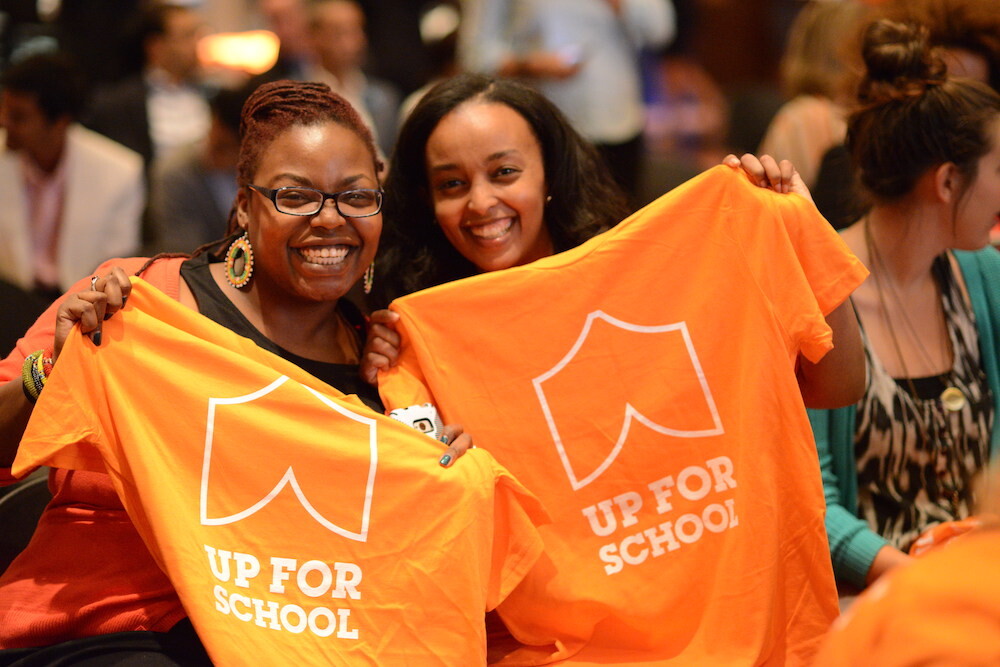
Youth activists with T-shirts to promote A World at School’s #UpForSchool campaign in 2015
A global movement was needed to advocate for education – led by passionate young people. So Theirworld launched A World at School. It was to grow into a community of millions of people campaigning for every child’s right to quality learning.
Working with partners and United Nations Special Envoy for Global Education Gordon Brown, A World at School set up the first Youth Takeover of the UN. It featured the famous speech by Malala Yousafzai, in which she said: “One child, one teacher, one pen and one book can change the world.”
In 2014, A World at School and partners organised a similar Youth Takeover of the African Union. The movement was growing and allowing the voices of young activists to be heard in their own countries and beyond.
7. We drive double-shift schools for Lebanon in 2013
- Watch our video from 2021 about the how we continue to help refugee children in Lebanon.
The Syrian conflict had forced hundreds of thousands of people to flee into neighbouring countries. In Lebanon, that resulted in huge numbers of vulnerable refugee children unable to go to school.
This was the moment when Theirworld and our A World at School movement began to show the power of tackling an issue in a holistic way – identifying possibilities, formulating plans, rallying key figures and organisations, and campaigning for change and funding. It’s the way we’ve worked ever since.
We commissioned and published an influential report by Kevin Watkins – then Executive Director of the Overseas Development Institute – that advocated the idea of double-shift schools. This meant using the same school buildings being for Lebanese and Syrian children at different times of the day – an idea later adopted by the Lebanese government.
In 2017, Kevin said: “The results have been pretty extraordinary. Something like 75% of Lebanese refugee children, school-aged children, are now in school. That figure was in the low 20% four years ago.”
We also developed projects in Lebanon to overcome barriers to schooling, including providing milk and nutritious snacks and introducing better technology to classrooms. Theirworld continues to support key personnel to deliver education for more than 300,000 refugee children in Lebanon. During the pandemic, we have provided digital skills to teachers to ensure children continue to learn.
8. Nigeria Safe Schools Initiative in 2014
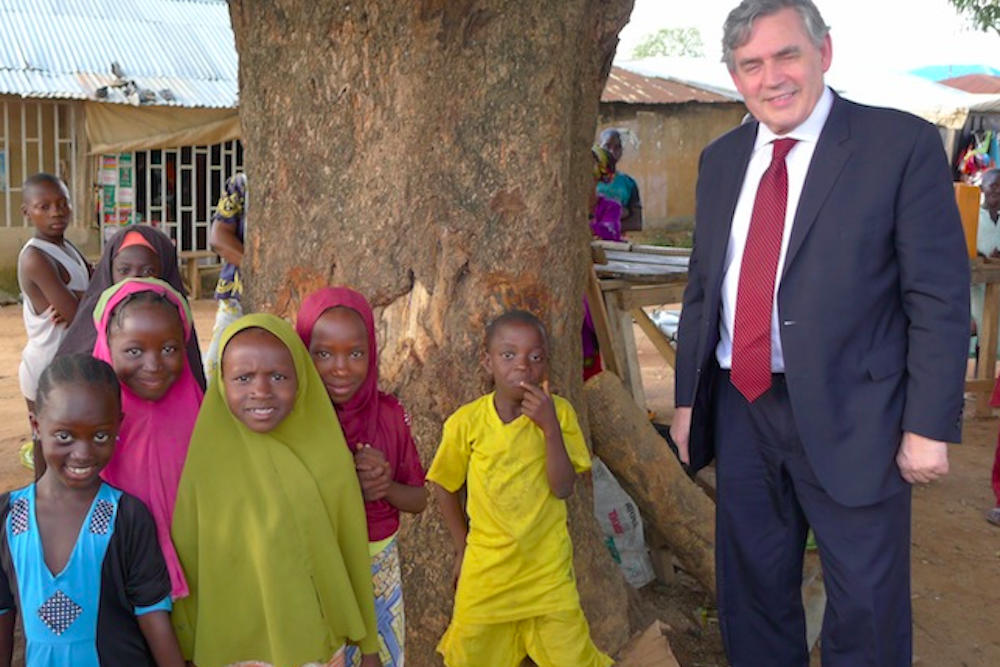
Gordon Brown, UN Special Envoy for Global Education, meets children in Nigeria in 2014
The world was shocked by the kidnapping of more than 270 girls from a school in Chibok, Nigeria. In the wake of this and other attacks on education, the Safe Schools Initiative Nigeria was launched.
Championed by A World at School and UN Special Envoy for Global Education Gordon Brown, it started with an investment from the Global Business Coalition for Education and matching contributions from businesses, the Nigerian government and the international donor community.
The initiative directly supported more than 50,000 children in the northern states.
Theirworld later launched other Safe Schools Initiatives for Syrian refugees, children affected by the Ebola crisis, students in Latin America and in Pakistan – where, in the wake of the 2015 Peshawar school massacre, A World at School and the GBC-Education made a series of recommendations which were endorsed by the country’s Prime Minister.
9. #UpForSchool petition gets 10m signatures in 2015
At a youth rally in New York in 2014, A World at School launched the #UpForSchool campaign. Its aim was to harness a global movement to demand that world leaders kept their Millennium Development Goals promise to get every child into primary school.
#UpForSchool youth rallies were held in Kenya, Democratic Republic of the Congo, Norway, India and the United Kingdom and a petition was launched to gather millions of signatures. Some amazing partners came on board – including Angry Birds, who launched a special #UpForSchool game, and even the Count from Sesame Street. NGOs including Muslim Aid, World Vision Bangladesh, BRAC and Idara-e-Taleem-o-Aagahi helped us to collect signatures.
So did our Global Youth Ambassadors, who gathered one million names, many by going door to door with paper petitions. One GYA even trekked for 11 days through the Himalayas to gather names.
In September 2015, singer, education campaigner and Theirworld supporter Shakira delivered the #UpForSchool Petition, with more than 10 million signatures, to the UN. It was the biggest education petition in history, signed by world leaders, celebrities, business leaders, faith groups, communities and young people. Shakira said: “We can be the first society to eradicate poverty and to figure out an intelligent way to bring education for all. But we need to move faster.”
10. Edinburgh Birth Cohort begins its 25-year journey in 2015
Building on the success of the Jennifer Brown Research Laboratory, The Theirworld Edinburgh Birth Cohort was launched at the University of Edinburgh. It is a ground-breaking 25-year study in which researchers follow 400 newborns from birth to adulthood to find new ways of preventing and treating brain injuries in babies.
The team are tracking the children’s lifelong health and development and hope this will lead to an understanding of how being born too soon affects health in later life.
“Research saves lives and changes lives,” said Professor James Boardman, the laboratory’s Scientific Director.
Emma Torry, mother of two children in the cohort, said in 2019: “We were approached by a midwife and asked to join the cohort. My husband and I agreed immediately. Being born premature can affect your whole life, so I feel very proud being part of a study that is so important.”
11. Intensifying support for Syrian refugees in 2015
- Watch our video from 2016 about the #YouPromised campaign.
As the Syrian conflict forced more people to flee, A World at School and GBC-Education created a collection of ground-breaking, in-depth reports on the state of education for refugee children in Jordan, Turkey and Lebanon.
They warned that a lack of donor funding was leaving one million children out of school and at risk of child labour, early marriage, exploitation and extremism.
We continued to press world leaders to take urgent action. After they pledged in early 2016 to get every Syrian refugee into school, we launched the #YouPromised campaign to hold them to account.
In 2018, Theirworld attended the Syria pledging conference with celebrity magician Dynamo, who addressed European Commissioners on education funding for refugees. He told them: “Education is the closest thing to real magic that you can give a child.”
12. Code Clubs are launched in 2016
- Watch our video from 2016 about the launch of Code Clubs in Nigeria.
Theirworld knew that a digital divide was threatening to leave many girls behind on technology skills. We launched Code Clubs – safe spaces where girls could learn and develop their skills, confidence and creativity.
The first clubs were set up in Kenya and Uganda, followed by others in Nigeria (watch the video above), Tanzania, Zimbabwe and Lebanon. Girls learned how to build a computer, make games and artworks, and express themselves with code. Older students also gained skills for future employment, entrepreneurship and business.
We later launched Skills for their Future, which aims to make the digital literacy curriculum available to young people aged 16 to 20.
Jacinta, a student at Gachororo Secondary School in Kiambu County, Kenya, said: “The first time I heard about this programme, I was excited. It feels privileged because as young teenagers, we have been able to gain knowledge and also have those skills on computers.”
13. Turkey trauma and language programmes begin in 2016
Turkey hosts more refugees than any other country – and half of them are children. Many are still out of school and even those who are enrolled can suffer the effects of trauma.
Theirworld worked with a local partner to set up Turkish language programmes to ensure a smooth transition for refugees into the public school system.
In 2017, we also began working with the Maya Vakfi organisation to pilot a programme aimed at helping Turkish teachers spot the signs of trauma and help them provide support to these students. The Trauma Informed Schools programme has been so successful that it was named as a winner of the 2021 WISE Awards, which recognises successful and innovative global education projects.
Esra Özsüer, founder and President of the foundation, said: “It is an honour for us. This award motivates us to further disseminate our Trauma Informed Schools programme to promote socio-emotional wellbeing of students and achieve quality education. We’re very grateful to Theirworld for their support.”
14. Education Cannot Wait gets off the ground in 2016
"Our past does not define our future. The violence, insecurities and crises that have defined the past will only inspire us to do more, to act quicker & to build a stronger and more resilient foundation." ~ @YasmineSherif1, #ECW Director@BMZ_Bund @NorwayMFA @SweMFA @CanadaDev pic.twitter.com/o1C9CKQ0Y9
— Education Cannot Wait (@EduCannotWait) December 29, 2021
When conflict or crisis erupts, there is an urgent need for food, water, shelter and protection. But education has to follow quickly or children could drop out of school forever and be lost to child marriage, child labour or other risks.
In 2015, Theirworld led the way in calling for a new and innovative way to meet the education needs of children in emergencies. At the time, less than 2% of humanitarian aid went to education despite 75 million children being deprived of learning in crisis areas.
We identified the need for a new fund. We showed what it could achieve. We rallied the support of other civil society organisations, academics and politicians. And our Global Youth Ambassadors delivered the Safe Schools Petition, with more than 250,000 signatures from A World at School supporters, to the World Humanitarian Summit in Istanbul in 2016.
Leaders announced the launch of Education Cannot Wait, the first fund of its kind. Since then, its emergencies and protracted crises response has reached more than 4.6 million children. ECW’s Covid-19 response has helped a further 29.2 million children.
ECW Director Yasmine Sherif said last year that additional funding could help to get every crisis-affected child in school. She said: “This is something that can be done. With financing, it is possible.”
15. We widen our focus on early years in 2016
- Watch our video from 2017, featuring comedians promoting Theirworld’s #5for5 campaign on early childhood development.
With the success of the Jennifer Brown Research Laboratory and the Theirworld Edinburgh Birth Cohort, it was natural that our focus on very young children would increase. In 2016, we began to raise awareness of the crucial development that takes place in the first five years of a child’s life.
Backed by extensive research and reports, Theirworld launched the #5for5 campaign to put pressure on world leaders to take urgent action to ensure all children, especially the poorest and most marginalised, have access to a full range of nurturing care. Well-known comedians from the UK, US and Kenya dressed as babies for a series of memorable videos (watch the video above).
In 2019, we published a hard-hitting report – Leaving the Youngest Behind – that revealed investment in learning for under-fives had decreased. We partnered with UNICEF to call for international donors and countries to invest 10% of their education spending on early childhood education. At an event in Washington, DC, Theirworld President Justin van Fleet said: “We’d have a healthier, wealthier and kinder world if every child had pre-primary education.”
A particular focus has been in Kenya, where Theirworld supports high-quality, accessible early childhood development and education, with a particular emphasis on the needs of the most marginalised children, especially those affected by HIV/AIDS.
In 2021, we published a report on how improved teacher development can play a huge role in ensuring quality early learning for refugee children.
16. Youth campaign leads to a new global fund in 2018
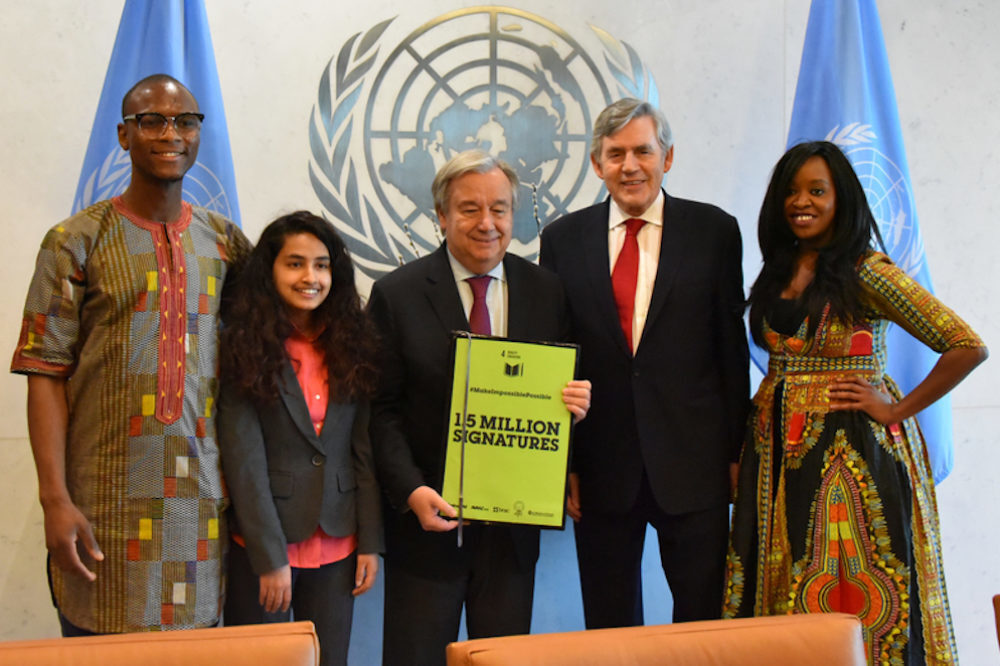
The IFFEd petition is handed to António Guterres by Global Youth Ambassadors Ousmane Ba, Asmita Ghimire and Lian Wairimu Kariuki, watched by Gordon Brown (Education Commission/Lana Wong)
The launch of Education Cannot Wait had addressed a need for education in emergency situations. But there was still a major gap when it came to financing schooling for millions of marginalised children living in the “missing middle” countries which lie between the developing world and rich nations.
The answer identified by the Education Commission was a new global fund to unlock billions of dollars. Theirworld and partners began campaigning and in 2018 three of our Global Youth Ambassadors delivered messages from 1.5 million people to UN Secretary-General António Guterres.
Soon after at the UN General Assembly, the International Finance Facility for Education (IFFEd) was backed by world leaders, the business community and international donors.
UN Deputy Secretary-General Amina Mohammed said: “We heard from young people across the world, who sent in millions of signatures asking us to take urgent action so that they have greater opportunities to enjoy what are their rights and pursue their dreams.”
17. Our work with Greek islands refugees starts in 2019
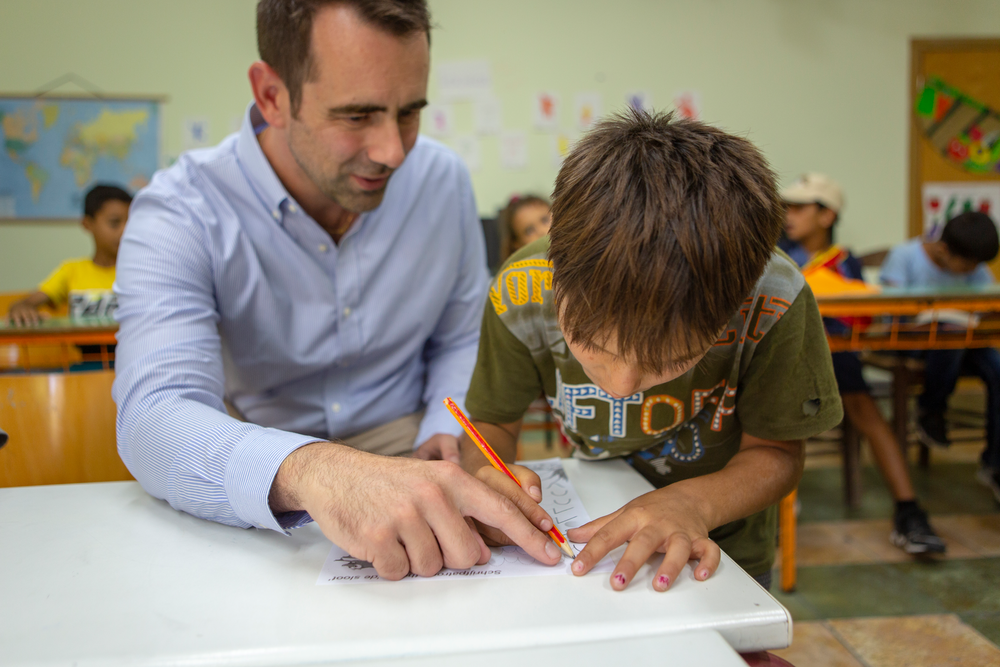
Theirworld President Justin van Fleet with children during a visit to the Greek islands in 2019
The plight of refugee children who landed on the Greek Aegean Islands was beginning to make headlines. Children from Syria, Afghanistan and other conflict-hit countries were meant to be moved quickly to mainland Greece – but many stayed a year or longer in squalid, overcrowded island camps with little or no education.
Theirworld realised a multi-layered approach was needed. We combined original research, campaigning for funds and partnering with UN agencies and local organisations to help deliver hope and a better future for those children.
In 2019, we announced a project with Education Cannot Wait to send 5,000 girls and boys to school on the islands. The following year, we produced a key report that concluded 20 million euros was needed to safely keep open educational programmes. Support from Theirword also allowed a non-formal education centre to expand on the island of Lesvos. When the pandemic struck, grants from the National Postcode Loterij to Theirworld allowed other education projects to continue.
In June 2021, there was a major breakthrough when the Greek government announced it would adopt a blueprint from Theirworld to provide education for all refugee children on the islands. Luciano Calestini, UNICEF’s Representative in Greece, said: “We would like to thank Theirworld for its critical support for refugee education in Greece and for the vision for change it presented. It has offered acutely at-risk children some sense of normality and the chance to imagine a better life.”
18. The Key unlocks big change in 2020
- Watch our video from 2020 about the launch of The Key.
Education is the key to learning, to unlocking children’s future success. But it also plays a crucial role in tackling some of the world’s biggest challenges, such as climate change, poverty, migration and food security.
With more people wanting to become involved in campaigning for global education, Theirworld and GBC-Education created a comprehensive information toolkit to help everyone make a clear and robust case.
The Key (available free online) contains messages, statistics, talking points and infographics about dozens of subjects where education plays a key role – from refugees and inequality to public health and financial literacy. It allows users to “copy, paste and advocate” by downloading material and reproducing it to suit their needs.
19. We create the Education Finance Playbook in 2021
DYK: #ECW is featured as one of the main education-specific funds in The Education Finance Playbook by @theirworld.
Check it out to learn more about what is needed to ensure that equitable & inclusive quality education is available for all by 2030!????: https://t.co/PXt41fEcjY pic.twitter.com/Y9LdSmgYbG
— Education Cannot Wait (@EduCannotWait) January 4, 2022
As Covid-19 swept across the world in the spring of 2020, few could have foreseen the catastrophic effect it was about to have on education. But in early April of that year, Theirworld was already warning that world leaders would fail a generation of children if they didn’t prioritise education in their recovery plans.
Our call for urgent action came in 2021 with the Education Finance Playbook – a practical guide for governments, donors and philanthropists to fund quality, inclusive education for all by 2030. It identified a global education shortfall of $59 billion a year.
Alexandra van der Ploeg, Head of Corporate Social Responsibility at software company SAP, said: “The Education Finance Playbook is an invaluable resource for SAP, as we think about how we can have the greatest impact on education worldwide.”
20. From small beginnings to 1,000 new Global Youth Ambassadors
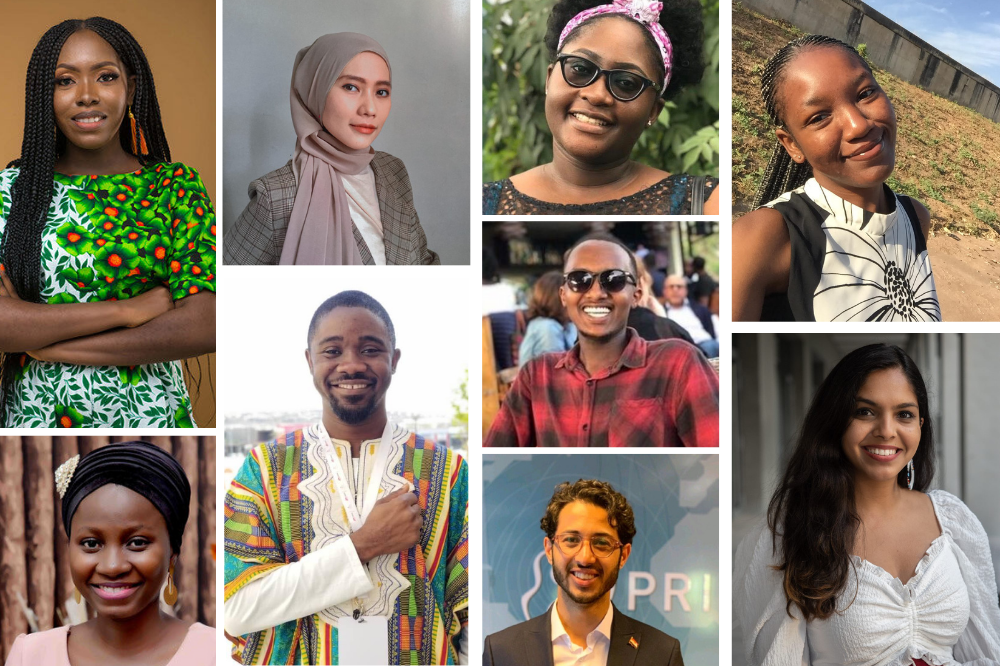
Our amazing Global Youth Ambassadors campaign for education in their communities and globally
When the A World at School was born in 2013, its ambition was to be led by young people. So the Global Youth Ambassador (GYA) programme was created. From small beginnings, each year there are now more than 1,000 new GYAs who join the programme across 90 countries.
The programme has grown but the guiding principle remains the same. Youth activists and social entrepreneurs aged 18 to 30 united in their passion for social justice and the right to education. They advocate and campaign for quality education in their own communities and around the world.
“Being a GYA has been an empowering platform for me. It has made me realise no change is too small,” said Bushra Farooq from India.
Our Global Youth Ambassadors were instrumental in the success of the #UpForSchool Petition in 2015. They delivered the Safe Schools Petition to the World Humanitarian Summit in 2016, a move which helped to create Education Cannot Wait. In 2018 GYAs delivered messages from 1.5 million people to the United Nations, in support of the International Finance Facility for Education.
Those moments have been on the world stage. But much of the work of our GYAs goes on at local level – making real changes in the lives of vulnerable and marginalised children.
The Global Youth Ambassadors represent everything Theirworld stands for. Since 2013, there have been more than 2,000 of them. Many have gone on to form their own initiatives and businesses or move into leadership roles in their communities. We are proud of their achievements and their continuing passion to unlock big change
And there's much more to come in 2022
During the pandemic, Theirworld has funded 10 new projects in seven countries – Lebanon, Turkey, Greece, Nigeria, Kenya, Uganda and Tanzania. The majority focused on supporting vulnerable learners who were out of school due to closures.
Throughout 2022, we’ll mark our 20th anniversary with new actions and innovations to give children the best start in life, a safe place to learn and skills for the future.
More news

